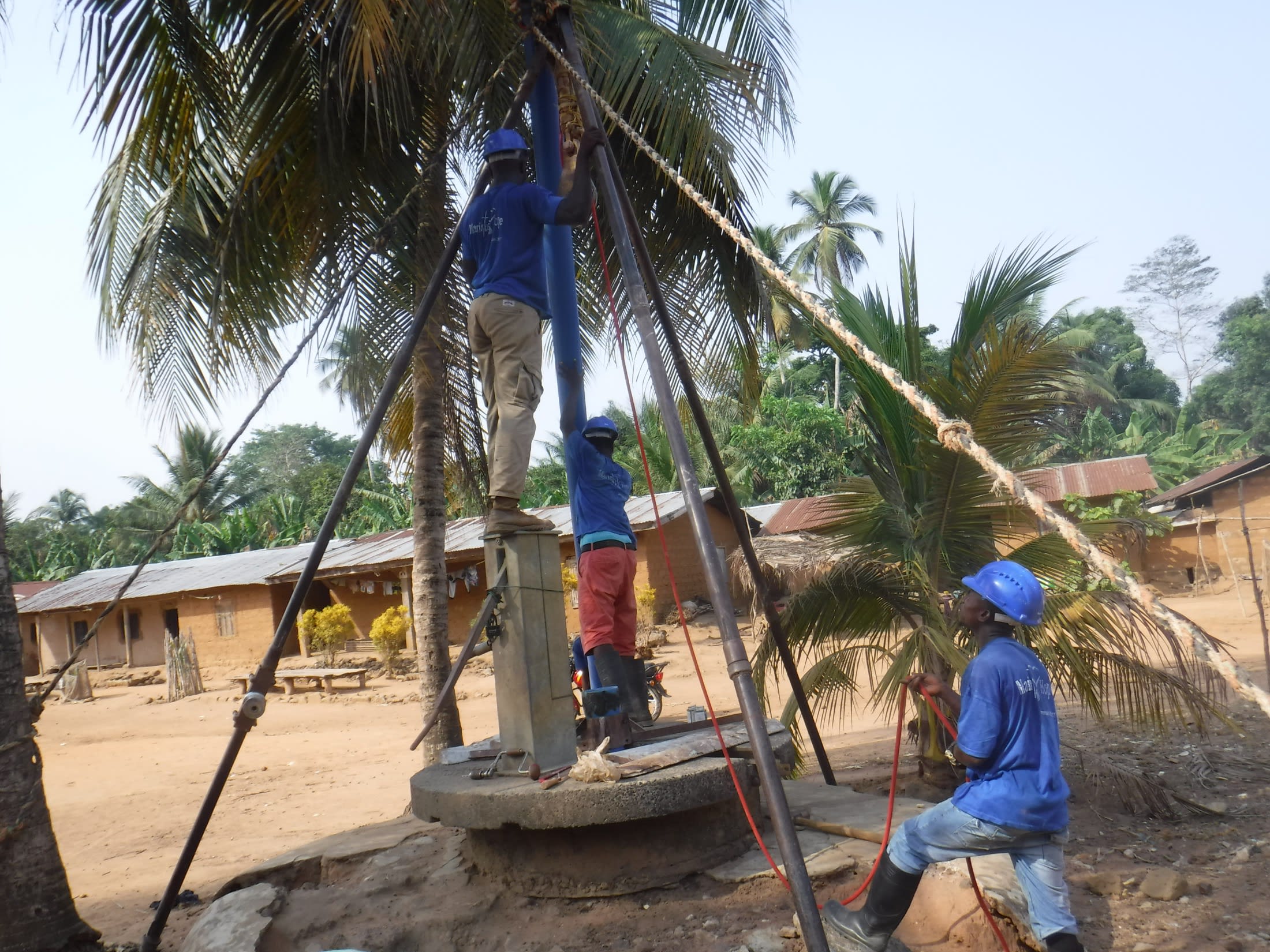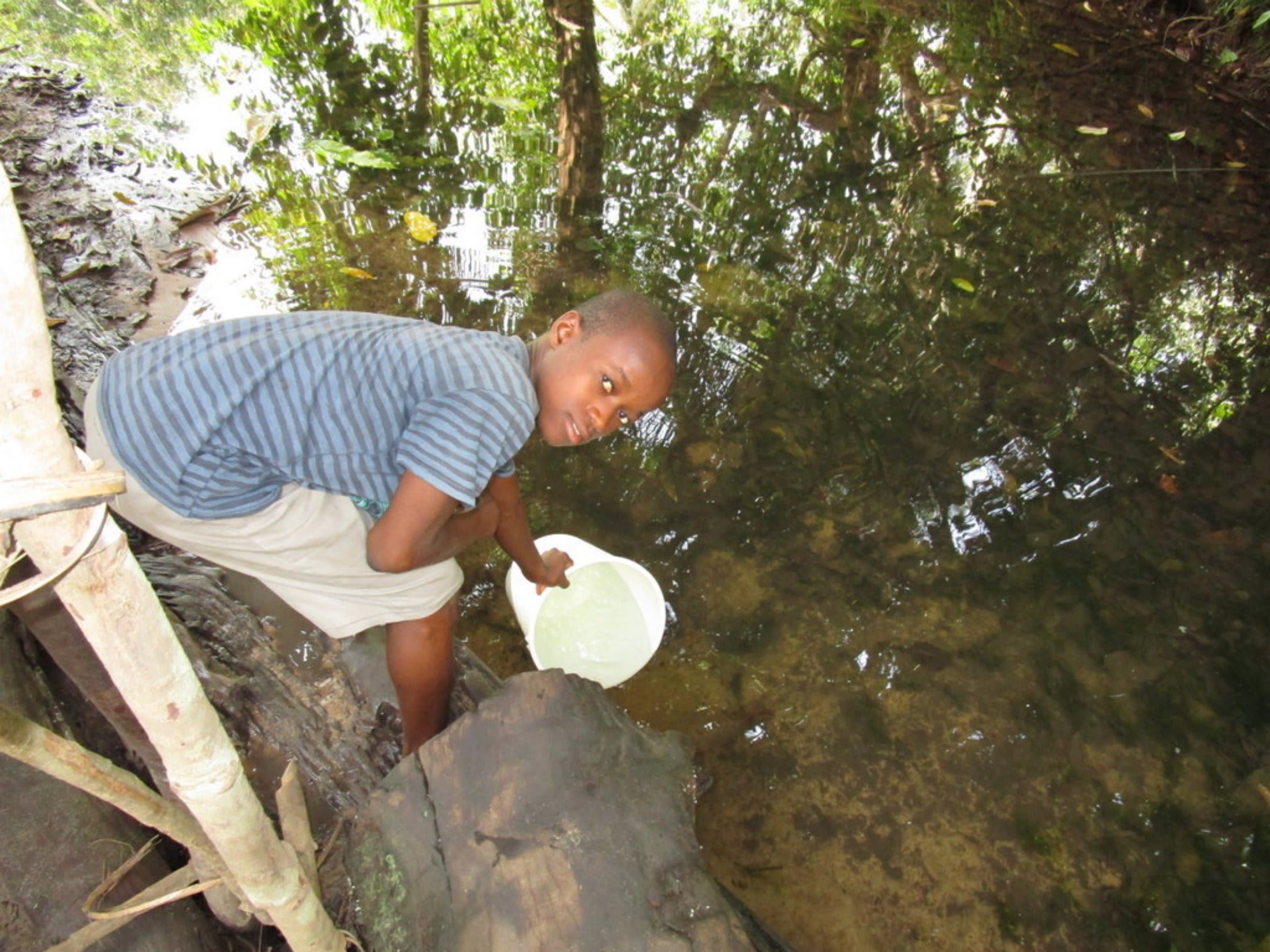May, 2021: Polloth Village, Kroo Town Area Project Complete!
We are excited to share a safe, reliable water point at Polloth Village in Sierra Leone is already providing clean water to students and neighboring community members! We also conducted hygiene and sanitation training, which focused on healthy practices such as handwashing and using latrines.

"My worries about looking for good water are now over. I will now put much time into my studies and other daily activities. This water point will help to bring me good health because it is exceptionally clean and pure to drink," said Lamine T, a teenaged student who lives near the well.

Clean Water Restored
The drill team arrived the day before beginning work. They set up camp and unpacked all of their tools and supplies to prepare for drilling the next day. The community provided space for them to store their belongings and meals for the duration of their stay. The following day, the work began.

Here is how we restored clean, reliable water here:
- Raised the tripod
- Found the original depth
- Socketed the pipes
- Installed casing
- Lined up the drill rods
- Drilled!

We reached a final depth of 16 meters with water at 11 meters. The hand-drill method allowed the team to install the cylinder far below the aquifer so that the community has great water access throughout the year.

- Installed screening and filter pack
- Cemented an iron rod to the well lining, and fixed it with an iron collar at the top
- Bailed the well by hand for three days and flushed it
- Tested the yield
- Built a cement platform, walls, and drainage system
- Installed a stainless steel India Mk11 pump
- Conducted a water quality test

Bailing the well

Finished well
The dedication of the newly completed well in Polloth Kroo Town village is a remarkable event, said our team. On arrival at the dedication ground, everyone was gathered at the water point, ready before starting the dedication. Community members, guests from the Ministry of Water Resources, a local Councilor, and our team attended the dedication program.

The event opened with individual silent prayers and was followed by a welcoming address by the Headman. The community members were all in a jubilant mood, singing in their local dialect (Temne), praising God for giving them a good water source. People spoke on behalf of the entire community, expressing their gratitude for the water project for making it possible for them to have a quality drinking water source right at their doorsteps.

"I am delighted to receive this great help. This water facility is a great help for my community at large and me. It gives me quick and easy access to quality drinking water. I believe that this will help to reduce the risk of drinking contaminated water and enhance a healthy life," shared Ya Alimammy Kanu, a farmer living in the village.
"It will prevent us from wasting time fetching water because I do not need to go far to fetch water. This water facility will also help reduce the burden of taking risks in going to the stream to fetch water. My children will no longer late for school because there is now a water facility at my doorstep."

It was amazing to see older people singing and dancing to be free from the water challenges in their community, our team recalled. They were highly active in all the sessions of the entire dedication program.
New Knowledge
Before conducting any hygiene training, we make repeated phone calls and visits to the local water user committee to better understand the community’s challenges and lack of sanitation facilities. We share the findings from our discussions with the committee members to help them make the necessary adjustments before the training begins. For example, we identify households without handwashing stations or may need to repair their latrines. With this information, community members can work together to improve hygiene and satiation at home.
After that, we schedule a time when members from each household using the water point can attend multi-day hygiene and sanitation training. When that is set, we dispatch our teams to the agreed-upon location to hold the meeting.

Polloth Kroo Town is a community surrounded by coconut, mango, and banana trees. Most of the houses in this community are shaded by these trees, which produce an excellent atmospheric condition. The hygiene and sanitation training took place in a privately owned compound. It was most appropriate because it was a central location for the community, and the venue was an open environment surrounded by coconut and mango trees with a very fresh atmosphere. The venue was so spacious more than fifty people could freely gather in line with the physical distancing protocol.

Nearly all of the fifty-two households in the community had a representative attend the three-day training. Training topics covered included handwashing and tippy taps; good and bad hygiene; disease transmission and prevention; worms and parasites; proper care of teeth; proper care of the pump; keeping the water clean; the cost recovery system; dish racks and clotheslines; the importance of toilets; keeping the latrine clean; balanced diets; the diarrhea doll; and HIV and AIDS.
"The training is valuable to me personally because it has widened my knowledge to know about how to practice hygiene and sanitation in my personal life and the community at large. With the knowledge I have got from the training, I strongly believe that I can make a change in making sure that we do all the things needed to be done to enhance good health," said John Kallay, a local teacher.

The session on worms and parasites was a topic that attracted the attention of every participant in the training. The community members were surprised to learn that worm infestations can occur when someone walks barefoot, especially children who take in worm larvae by walking in contaminated water. They also did not realize that worms and parasites can be contracted by eating food without handwashing or swimming in local lakes.
Participants became extremely interested in this topic because they have realized that they have been vulnerable to worm infestation due to a lack of knowledge about the topic. But now, they said, they are all happy to know the facts about worms and parasites. The group took home the new knowledge and skills to make a change about worms and parasites in their community.

"I believe that the new knowledge and skills I have learned from the training will help promote hygiene and sanitation practices and ensure the good health of everyone in my community. It has created awareness on regular handwashing, especially after using latrines, the essence of constructing a drying rack, rubbish pit, and the proper handling of latrines. I strongly believe that if only we practice all the knowledge and skills we have learned from the training, we can have a healthy community to live longer," said Mr. Kallay.
Thank you for making all of this possible!


 Borehole Well and Hand Pump
Borehole Well and Hand Pump




































